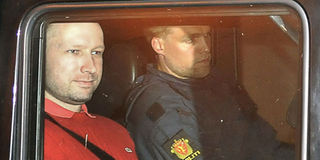Norway gunman stopped from talking to victims' families

Photo/AFP
Bomb and terror suspect Anders Behring Breivik (red top) leaves the courthouse in a police car in Oslo on July 25, 2011.
A judge Monday denied right-wing extremist Anders Behring Breivik, the confessed killer of 77 people in a July rampage in Norway, the right to address victims' families at his first public court appearance.
Behring Breivik, 32, was denied permission to address the families at the Oslo district court, where they were gathered along with journalists and members of the general public.
Judge Torkjel Nesheim also quickly interrupted him when he introduced himself.
"I am a military commander in a resistance movement," Behring Breivik said in a calm voice before questioning the legitimacy of the court to try him.
"You have been mandated by those who support multiculturalism. That is a hateful ideology that aims to destroy the Norwegian society," he told Nesheim.
The court had initially placed a gag order on reporting Behring Breivik's words for fear he would turn the hearing into a platform for his far-right ideology, but in the end lifted the order.
A ban on publishing pictures or video of the confessed killer however remained in effect.
Behring Breivik was dressed in a dark suit, white shirt and light blue tie and sporting a narrow blond beard at the hearing aimed at determining whether he can be held in custody for another 12 weeks.
His lawyer Geir Lippestad has asked that he be set free.
As at past hearings, Behring Breivik described his incarceration in virtual isolation as an "irrational torture method."
The previous custody extension hearings had all been held behind closed doors for fear that the confessed killer, who has said he acted alone in the July 22 attacks, might communicate with possible accomplices.
As the investigation has progressed, police have meanwhile said the theory that Behring Breivik had helpers appeared increasingly unlikely.
They therefore accepted that the public be allowed to attend Monday's hearing, but had requested that Behring Breivik himself only appear via video link from the high security Ila prison near Oslo, where he is being held.
Norway's Supreme Court rejected that request Friday, making it possible for the confessed killer to appear in person, as he wished.
Behring Breivik has admitted setting off a car bomb outside Norway's government offices in Oslo, killing eight people, before going on a shooting rampage on the nearby island of Utoeya where the ruling Labour Party's youth wing was hosting a summer camp.
Sixty-nine people, mostly teens, died in the shooting massacre.
In a 1,500-page manifesto he published on the Internet just before the attacks, Behring Breivik said he was on a "crusade" against Islam and professed his hatred for Western-style democracy, saying it had spawned the multicultural society he loathed.
He has confessed to the killings, which he said were "cruel but necessary," but has nonetheless insisted he is not criminally guilty and has rejected the legitimacy of the Oslo court.
Herman Heggertveit, a young survivor of the Utoeya massacre, attended Monday's hearing as "a form of therapy."
"It is very emotional and very difficult. It is like meeting another person," the young man, wearing a pin with a Labour Party rose, told reporters.
"He is arrogant, sure of himself. He is living in his own little bubble," he added.
After the hearing, Behring Breivik's lawyer Lippestad said he did not know what his client had intended to say to the families.
Since the beginning, Behring Breivik has sought as much publicity as possible.
"Our shock attacks are theatre, and theatre is always performed for an audience," he wrote in his manifesto.
If a psychiatric examination finds he can be held criminally responsible for his acts, his trial should open in April 2012.




